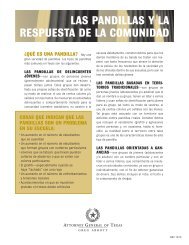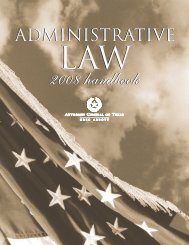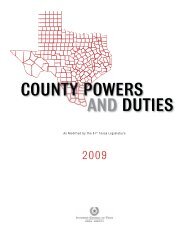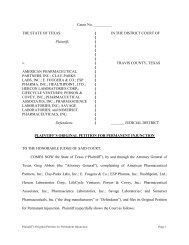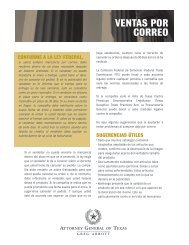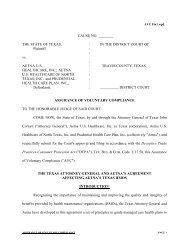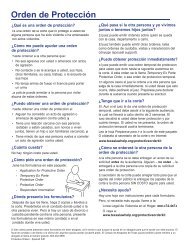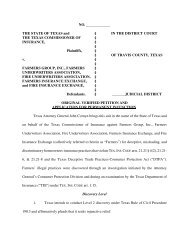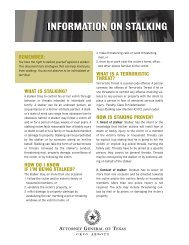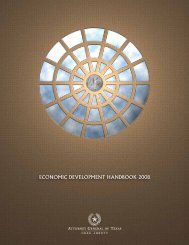- Page 1 and 2: REPORT OF THE OFFICE OF THE ATTORNE
- Page 3 and 4: TABLE OF CONTENTS Preface 1 HIPAA a
- Page 5 and 6: ules, policies, and procedures. She
- Page 7 and 8: health care privacy and has given n
- Page 9 and 10: eviewed their assigned codes to loo
- Page 11 and 12: HIPAA STATE LAW RESULT Requires a u
- Page 13 and 14: HIPAA, the Task Force generally not
- Page 15 and 16: HIPAA 45 C.F.R. § 164.508(c)(1) de
- Page 17: 65 Fed. Reg. at 82744. OCR also ind
- Page 21 and 22: Public Information Act because the
- Page 23 and 24: Elderly or Disabled Persons; Confid
- Page 25 and 26: Texas Administrative Code Section 1
- Page 27 and 28: Texas Administrative Code Section 2
- Page 29 and 30: Texas Administrative Code Section P
- Page 31 and 32: Texas Administrative Code Section 2
- Page 33 and 34: Texas Administrative Code Section 2
- Page 35 and 36: Texas Administrative Code Section 2
- Page 37 and 38: Texas Administrative Code Section 2
- Page 39 and 40: Texas Administrative Code Section 2
- Page 41 and 42: Texas Administrative Code Section 2
- Page 43 and 44: Texas Administrative Code Section 2
- Page 45 and 46: Texas Administrative Code Section 2
- Page 47 and 48: Texas Administrative Code Section 2
- Page 49 and 50: Texas Administrative Code Section 2
- Page 51 and 52: Texas Administrative Code Section P
- Page 53 and 54: Texas Administrative Code Section P
- Page 55 and 56: Texas Administrative Code Section P
- Page 57 and 58: Texas Administrative Code Section P
- Page 59 and 60: Texas Administrative Code Section 3
- Page 61 and 62: Texas Administrative Code Section 4
- Page 63 and 64: Texas Administrative Code Section P
- Page 65 and 66: Texas Administrative Code Section 4
- Page 67 and 68: Texas Administrative Code Section 4
- Page 69 and 70:
Texas Administrative Code Section 4
- Page 71 and 72:
Texas Business & Commerce Code 15.0
- Page 73 and 74:
Texas Business & Commerce Code Sect
- Page 75 and 76:
Cases & Common Law Principles Case
- Page 77 and 78:
Cases & Common Law Principles Case
- Page 79 and 80:
Texas Civil Practice & Remedies Cod
- Page 81 and 82:
Texas Code of Criminal Procedure Ar
- Page 83 and 84:
Texas Code of Criminal Procedure Ar
- Page 85 and 86:
Texas Family Code Section § 5.002
- Page 87 and 88:
Texas Family Code Section Related/
- Page 89 and 90:
Texas Family Code Section § 55.13
- Page 91 and 92:
Texas Family Code Section Related/
- Page 93 and 94:
Texas Family Code Section Related/
- Page 95 and 96:
Texas Family Code Section Related/
- Page 97 and 98:
Texas Family Code Section § 61.102
- Page 99 and 100:
Texas Family Code Section § 107.05
- Page 101 and 102:
Texas Family Code Section Related/
- Page 103 and 104:
Texas Family Code Section § 153.37
- Page 105 and 106:
Texas Family Code Section § 160.75
- Page 107 and 108:
Texas Family Code Section Related/
- Page 109 and 110:
Texas Family Code Section § 231.10
- Page 111 and 112:
Texas Family Code Section § 261.10
- Page 113 and 114:
Texas Family Code Section § 261.31
- Page 115 and 116:
Texas Family Code Section § 262.20
- Page 117 and 118:
Texas Family Code Section § 264.50
- Page 119 and 120:
Texas Government Code Section § 33
- Page 121 and 122:
Texas Government Code Section Relat
- Page 123 and 124:
Texas Government Code Section § 53
- Page 125 and 126:
Texas Government Code Section § 53
- Page 127 and 128:
Texas Government Code Section Relat
- Page 129 and 130:
Texas Government Code Section Relat
- Page 131 and 132:
Texas Government Code Section Relat
- Page 133 and 134:
Texas Health & Safety Code Section/
- Page 135 and 136:
Texas Health & Safety Code Section/
- Page 137 and 138:
Texas Health & Safety Code Section/
- Page 139 and 140:
Texas Health & Safety Code Section/
- Page 141 and 142:
Texas Health & Safety Code Section/
- Page 143 and 144:
Texas Health & Safety Code Section/
- Page 145 and 146:
Texas Health & Safety Code Section/
- Page 147 and 148:
Texas Health & Safety Code Section/
- Page 149 and 150:
Texas Health & Safety Code Section/
- Page 151 and 152:
Texas Health & Safety Code Section/
- Page 153 and 154:
Texas Health & Safety Code Section/
- Page 155 and 156:
Texas Health & Safety Code Section/
- Page 157 and 158:
Texas Health & Safety Code Section/
- Page 159 and 160:
Texas Health & Safety Code Section/
- Page 161 and 162:
Texas Health & Safety Code Section/
- Page 163 and 164:
Texas Health & Safety Code Section/
- Page 165 and 166:
Texas Health & Safety Code Section/
- Page 167 and 168:
Texas Health & Safety Code Section/
- Page 169 and 170:
Texas Health & Safety Code Section/
- Page 171 and 172:
Texas Health & Safety Code Section/
- Page 173 and 174:
Texas Health & Safety Code Section/
- Page 175 and 176:
Texas Health & Safety Code Section/
- Page 177 and 178:
Texas Health & Safety Code Section/
- Page 179 and 180:
Texas Health & Safety Code Section/
- Page 181 and 182:
Texas Health & Safety Code Section/
- Page 183 and 184:
Texas Health & Safety Code Section/
- Page 185 and 186:
Texas Health & Safety Code Section/
- Page 187 and 188:
Texas Health & Safety Code Section/
- Page 189 and 190:
Texas Health & Safety Code Section/
- Page 191 and 192:
Texas Health & Safety Code Section/
- Page 193 and 194:
Texas Health & Safety Code Section/
- Page 195 and 196:
Texas Health & Safety Code Section/
- Page 197 and 198:
Texas Health & Safety Code Section/
- Page 199 and 200:
Texas Health & Safety Code Section/
- Page 201 and 202:
Texas Health & Safety Code Section/
- Page 203 and 204:
Texas Health & Safety Code Section/
- Page 205 and 206:
Texas Health & Safety Code Section/
- Page 207 and 208:
Texas Health & Safety Code Section/
- Page 209 and 210:
Texas Health & Safety Code Section/
- Page 211 and 212:
Texas Health & Safety Code Section/
- Page 213 and 214:
Texas Health & Safety Code Section/
- Page 215 and 216:
Texas Health & Safety Code Section/
- Page 217 and 218:
Texas Health & Safety Code Section/
- Page 219 and 220:
Texas Health & Safety Code Section/
- Page 221 and 222:
Texas Health & Safety Code Section/
- Page 223 and 224:
Texas Health & Safety Code Section/
- Page 225 and 226:
Texas Health & Safety Code Section/
- Page 227 and 228:
Texas Health & Safety Code Section/
- Page 229 and 230:
Texas Health & Safety Code Section/
- Page 231 and 232:
Texas Health & Safety Code Section/
- Page 233 and 234:
Texas Health & Safety Code Section/
- Page 235 and 236:
Texas Health & Safety Code Section/
- Page 237 and 238:
Texas Health & Safety Code Section/
- Page 239 and 240:
Texas Health & Safety Code Section/
- Page 241 and 242:
Texas Health & Safety Code Section/
- Page 243 and 244:
Texas Health & Safety Code Section/
- Page 245 and 246:
Texas Health & Safety Code Section/
- Page 247 and 248:
Texas Health & Safety Code Section/
- Page 249 and 250:
Texas Health & Safety Code Section/
- Page 251 and 252:
Texas Health & Safety Code Section/
- Page 253 and 254:
Texas Health & Safety Code Section/
- Page 255 and 256:
Texas Health & Safety Code Section/
- Page 257 and 258:
Texas Health & Safety Code Section/
- Page 259 and 260:
Texas Health & Safety Code Section/
- Page 261 and 262:
Texas Health & Safety Code Section/
- Page 263 and 264:
Texas Health & Safety Code Section/
- Page 265 and 266:
Texas Health & Safety Code Section/
- Page 267 and 268:
Texas Health & Safety Code Section/
- Page 269 and 270:
Texas Health & Safety Code Section/
- Page 271 and 272:
Texas Health & Safety Code Section/
- Page 273 and 274:
Texas Health & Safety Code Section/
- Page 275 and 276:
Texas Health & Safety Code Section/
- Page 277 and 278:
Texas Health & Safety Code Section/
- Page 279 and 280:
Texas Health & Safety Code Section/
- Page 281 and 282:
Texas Health & Safety Code Section/
- Page 283 and 284:
Texas Health & Safety Code Section/
- Page 285 and 286:
Texas Health & Safety Code Section/
- Page 287 and 288:
Texas Health & Safety Code Section/
- Page 289 and 290:
Texas Health & Safety Code Section/
- Page 291 and 292:
Texas Health & Safety Code Section/
- Page 293 and 294:
Texas Health & Safety Code Section/
- Page 295 and 296:
Texas Health & Safety Code Section/
- Page 297 and 298:
Texas Health & Safety Code Section/
- Page 299 and 300:
Texas Health & Safety Code Section/
- Page 301 and 302:
Texas Health & Safety Code Section/
- Page 303 and 304:
Texas Health & Safety Code Section/
- Page 305 and 306:
Texas Health & Safety Code Section/
- Page 307 and 308:
Texas Health & Safety Code Section/
- Page 309 and 310:
Texas Health & Safety Code Section/
- Page 311 and 312:
Texas Health & Safety Code Section/
- Page 313 and 314:
Texas Health & Safety Code Section/
- Page 315 and 316:
Texas Health & Safety Code Section/
- Page 317 and 318:
Texas Health & Safety Code Section/
- Page 319 and 320:
Texas Health & Safety Code Section/
- Page 321 and 322:
Texas Human Resources Code Section
- Page 323 and 324:
Texas Human Resources Code Section
- Page 325 and 326:
Texas Human Resources Code Section
- Page 327 and 328:
Texas Human Resources Code Section
- Page 329 and 330:
Texas Human Resources Code Section
- Page 331 and 332:
Texas Human Resources Code Section
- Page 333 and 334:
Texas Human Resources Code Section
- Page 335 and 336:
Texas Human Resources Code Section
- Page 337 and 338:
Texas Human Resources Code Section
- Page 339 and 340:
Texas Insurance Code Section/Articl
- Page 341 and 342:
Texas Insurance Code Section/Articl
- Page 343 and 344:
Texas Insurance Code Section/Articl
- Page 345 and 346:
Texas Insurance Code Section/Articl
- Page 347 and 348:
Texas Insurance Code Section/Articl
- Page 349 and 350:
Texas Insurance Code Section/Articl
- Page 351 and 352:
Texas Labor Code Section Chapter 1
- Page 353 and 354:
Texas Labor Code Section Related/ C
- Page 355 and 356:
Texas Labor Code Section Related/ C
- Page 357 and 358:
Texas Labor Code Section Chapter 93
- Page 359 and 360:
Texas Labor Code Section Chapter 30
- Page 361 and 362:
Texas Labor Code Section Related/ C
- Page 363 and 364:
Texas Labor Code Section Related/ C
- Page 365 and 366:
Texas Labor Code Section Chapter 50
- Page 367 and 368:
Texas Labor Code Chapter/ Section R
- Page 369 and 370:
Texas Labor Code Chapter/ Section R
- Page 371 and 372:
Texas Labor Code Chapter/ Section R
- Page 373 and 374:
Texas Labor Code Chapter/ Section C
- Page 375 and 376:
Texas Labor Code Chapter/ Section C
- Page 377 and 378:
Texas Labor Code Chapter/ Section
- Page 379 and 380:
Texas Labor Code Chapter/ Section
- Page 381 and 382:
Texas Labor Code Chapter/ Section R
- Page 383 and 384:
Texas Occupations Code Section § 5
- Page 385 and 386:
Texas Occupations Code Section Rela
- Page 387 and 388:
Texas Occupations Code Section Rela
- Page 389 and 390:
Texas Occupations Code Section Rela
- Page 391 and 392:
Texas Occupations Code Section Rela
- Page 393 and 394:
Texas Occupations Code Section Rela
- Page 395 and 396:
Texas Occupations Code Section Rela
- Page 397 and 398:
Texas Occupations Code Section Rela
- Page 399 and 400:
Texas Occupations Code Section § 1
- Page 401 and 402:
Texas Occupations Code Section Rela
- Page 403 and 404:
Texas Occupations Code Section Rela
- Page 405 and 406:
Texas Occupations Code Section Rela
- Page 407 and 408:
Texas Occupations Code Section Rela
- Page 409 and 410:
Texas Occupations Code Section Rela
- Page 411 and 412:
Texas Occupations Code Section Rela
- Page 413 and 414:
Texas Occupations Code Section Rela
- Page 415 and 416:
Texas Occupations Code Section Rela
- Page 417 and 418:
Texas Occupations Code Section Rela
- Page 419 and 420:
Texas Occupations Code Section Rela
- Page 421 and 422:
Texas Occupations Code Section Rela
- Page 423 and 424:
Texas Occupations Code Section Rela
- Page 425 and 426:
Texas Occupations Code Section Rela
- Page 427 and 428:
Texas Occupations Code Section Rela
- Page 429 and 430:
Texas Occupations Code Section Rela
- Page 431 and 432:
Texas Occupations Code Section Rela
- Page 433 and 434:
Texas Occupations Code Section Rela
- Page 435 and 436:
Texas Occupations Code Section § 4
- Page 437 and 438:
Texas Occupations Code Section Rela
- Page 439 and 440:
Texas Occupations Code Section Rela
- Page 441 and 442:
Texas Occupations Code Section Rela
- Page 443 and 444:
Texas Occupations Code Section Rela
- Page 445 and 446:
Texas Occupations Code Section Rela
- Page 447 and 448:
Texas Occupations Code Section Rela
- Page 449 and 450:
Texas Occupations Code Section Chap
- Page 451 and 452:
Texas Occupations Code Section Rela
- Page 453 and 454:
Texas Occupations Code Section Rela
- Page 455 and 456:
Texas Occupations Code Section Chap
- Page 457 and 458:
Texas Occupations Code Section Chap
- Page 459 and 460:
Texas Occupations Code Section Rela
- Page 461 and 462:
Texas Occupations Code Section Rela
- Page 463 and 464:
Texas Rules of Appellate Procedure
- Page 465 and 466:
Texas Rules of Evidence Rule Relate
- Page 467:
Texas Transportation Code Section R



